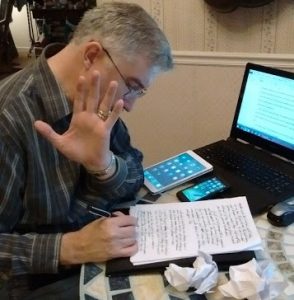Your muse gives you a great story idea. You just started writing the story and your muse arrives again and whispers about a second, completely different, story. “But I’m not done with the first one,” you say. Actually, forget both of those,” the muse says, “I’ve got a third story for you…”
 Your muse, like all of them, isn’t the most focused entity around. Easily distracted by new and shiny objects, she comes up with fresh ideas all the time.
Your muse, like all of them, isn’t the most focused entity around. Easily distracted by new and shiny objects, she comes up with fresh ideas all the time.
However, she never sticks around to help write the stories. She leaves that task to you. Moreover, her rate of creating ideas is far faster than your rate of story writing. As a writer, how do you handle this backlog problem?
Before I list various coping strategies, be aware that WIP is a term writers use meaning Work in Progress, the story you’re actively working on. Here, now, are some ways to deal with the idea backlog problem. You could:
- Start each story as your muse suggests it, and deal with having several WIPs at once.
- Make a list of all story ideas as your muse suggests them, and come back to that list as you finish each WIP.
- Ignore your muse while working on your WIP, accepting that you’ll lose some ideas.
- Restrict your stories to a series about a single set of characters or a single genre, and ignore your muse’s ideas that don’t fit those restrictions.
There may be other techniques as well, and I’d love to hear you tell me about them.
Many writers opt for the first strategy of writing several WIPs at once. They shift from story to story, progressing as their enthusiasm and focus allow. This has the advantage of starting each story when the idea is fresh, but the potential disadvantages of mixing up stories or never finishing any.
Others maintain a lengthening list of story ideas, updated each time the muse whispers. They work on a single story until it’s finished, then pick the next WIP from the list. This keeps the writer focused on one WIP without losing any ideas, but the writer might return to the listed story idea and not recall the muse’s enthusiasm that made it a good idea.
Some simply ignore the muse while writing a single WIP. This is probably more common among novelists than among short story writers. Novelists must maintain total focus for the long term to finish their WIP. This allows that focus, but risks losing some good ideas.
If you can restrict your writing to one genre or setting or a set of characters, then you can disregard any ideas from your muse that don’t fit. This certainly works as long as you remain enthusiastic about your chosen niche.
Your chosen strategy will depend on your particular circumstances, including the persuasiveness and creativity of your muse, and your ability to focus or willingness to work on several WIPs at once. If one strategy doesn’t work for you, try a different one, or combine them.
Gotta go. My muse just whispered a great story idea to—
Poseidon’s Scribe

 We live in a distraction-rich environment. Even before the Internet, there were rooms to clean, library books to return, lawns to mow, desk items to straighten, and windows to gaze through. Today, there are Facebook posts to like, tweets to retweet, texts to answer, online stores to shop in, blog posts to read, and new sites to explore.
We live in a distraction-rich environment. Even before the Internet, there were rooms to clean, library books to return, lawns to mow, desk items to straighten, and windows to gaze through. Today, there are Facebook posts to like, tweets to retweet, texts to answer, online stores to shop in, blog posts to read, and new sites to explore.